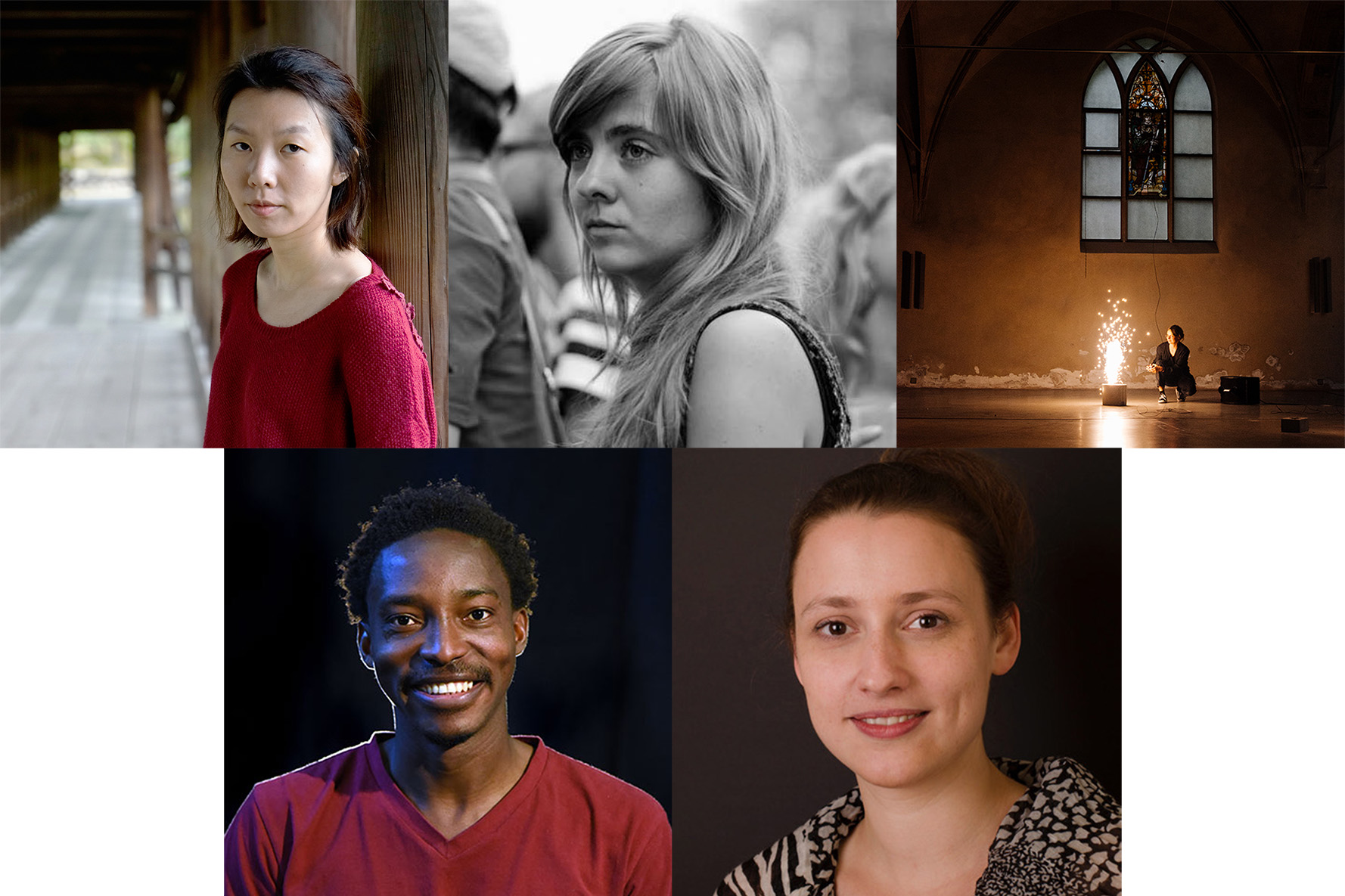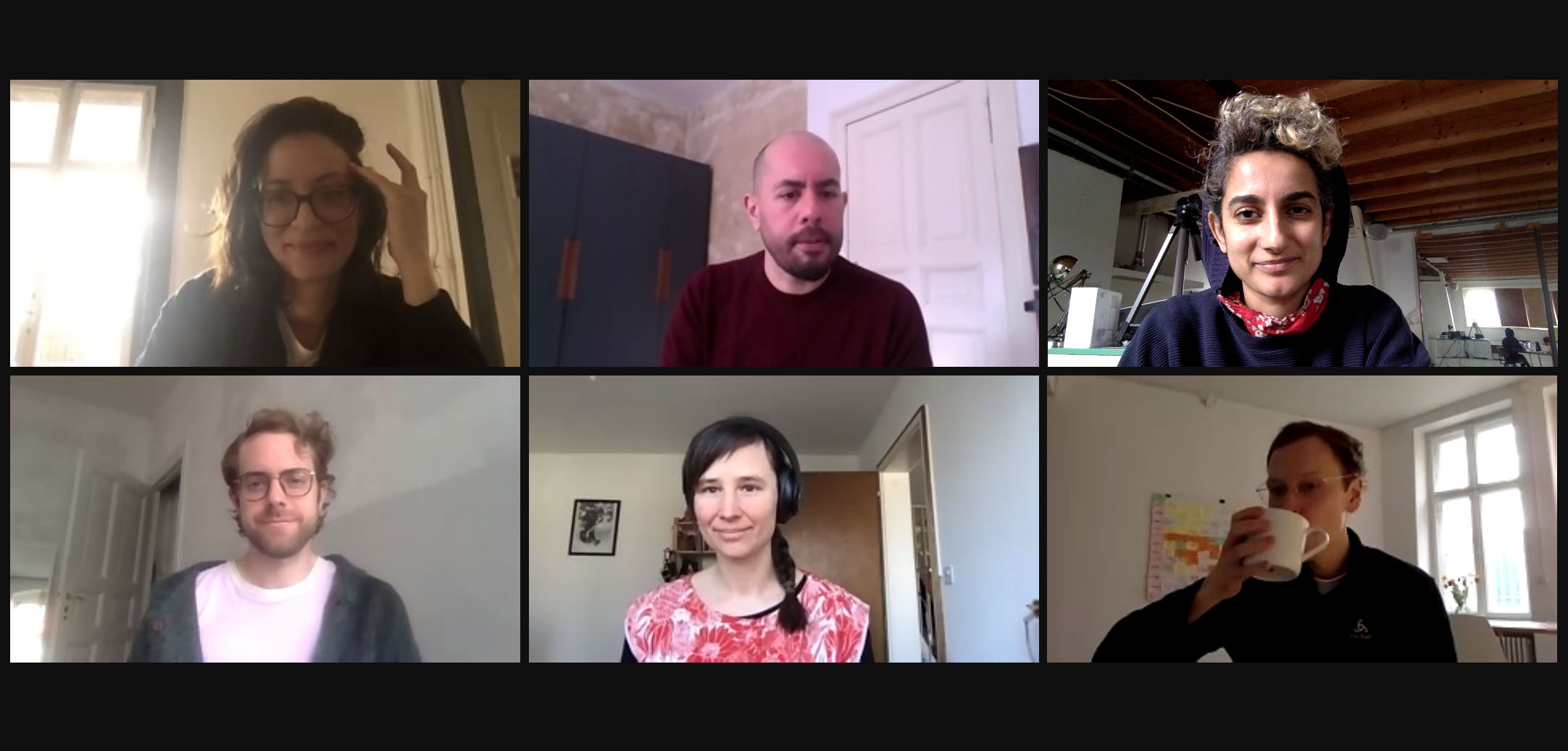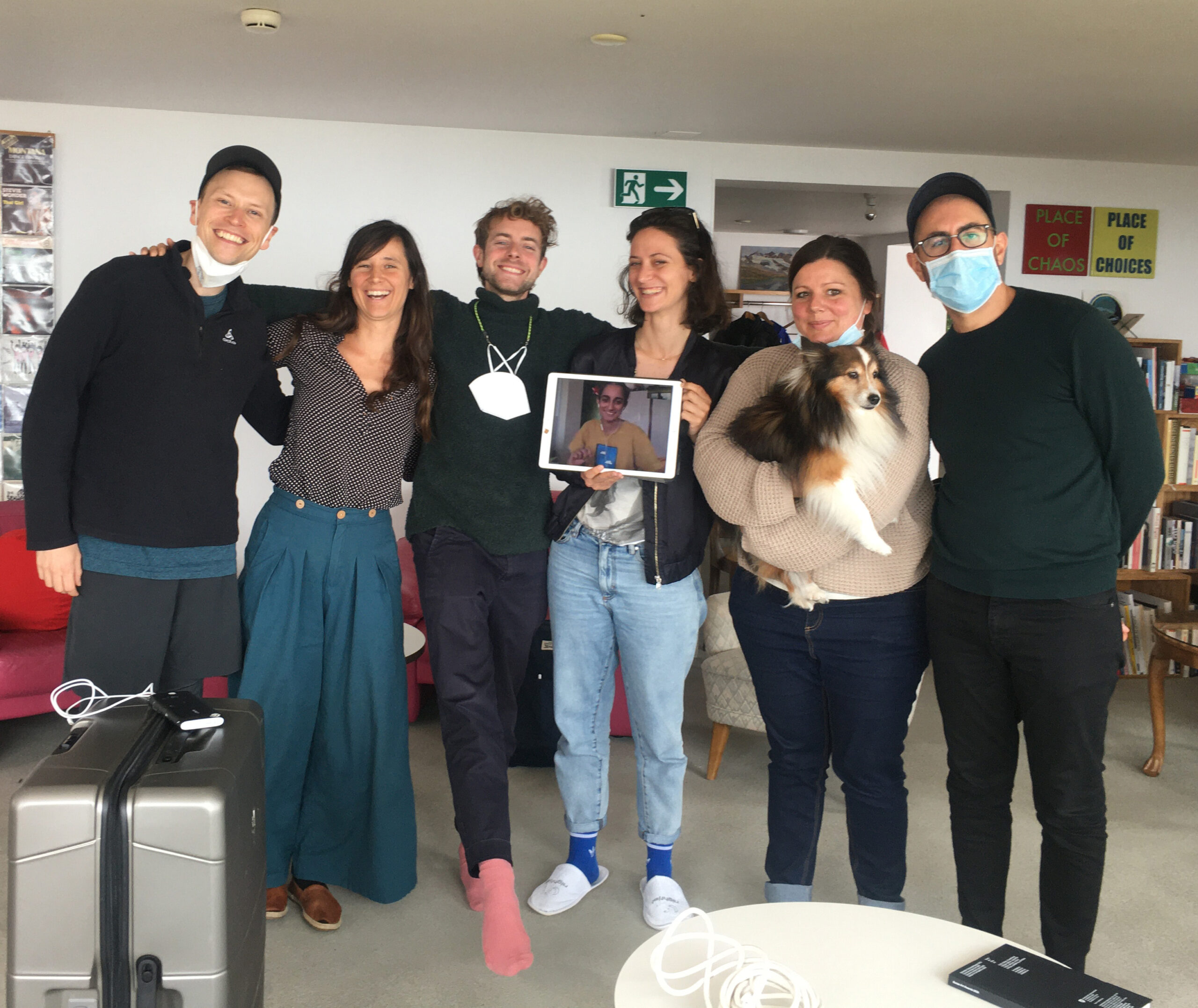PEERS
Programme 2024
Programme for Emerging Artistic Researchers
PEERS is a new pre-PhD programme of the Department of Performing Arts and Film at Zurich University of the Arts (ZHdK). Its main aim is to support emerging artistic researchers who are interested in pursuing a doctorate in the arts, foremost yet not exclusively in the performing arts and film.For a period of one year, starting in March, participants get the opportunity to benefit from an intensive mentoring and training programme. They become part of the vibrant research environment at ZHdK (such as lab-practice, colloquia, symposia, research academy), and gain access to the University’s outstanding infrastructure and relevant professional networks. Participants also benefit from peer-to-peer learning in the Junior Research Group and receive tailored support aimed at promoting their individual development. They are assisted in developing their individual research plan, as well as in searching and applying for artistic PhD programmes at ZHdK and beyond.
Programme activities:
- Mentoring: PEERS participants are mentored by two mentors, which are choosen individually from a pool of mentors at ZHdK, our partner universities, and beyond. Every participant receives 44 mentoring hours during the year (equivalent to one contact hour a week during the semester).
- Workshops & training: Four intensive workshops and classes on artistic research methods, application strategies for PhD programmes, and presentation skills (14 days in total), as well as a one-week summer residency.
- Junior Research Group (JRG): PEERS participants are part of the JRG, together with PhD students of the department. The JRG offers innovative collaboration formats, practice-led research and ongoing peer-to-peer-learning.
- International exchange: The PEERS programme collaborates with 3rd Cycle Programmes at Amsterdam University of the Arts and UdK Berlin, as well as with partner institutions of the PhD Programme (in Graz, Potsdam-Babelsberg, and Stockholm). Exchange is fostered by joint events during the year that are open to PEERS participants.
- Individual development: An individual financial plan will be devised with every participant at the beginning of the programme. Participants are each awarded a personal budget of up to CHF 3’000. This amount can be used to cover research trips, equipment, books, conference or festival participation, as well as other activities and measures serving to develop one’s research plan. We also cover participants’ travel expenses to Zurich and their accommodation costs.
The programme also provides access to ZHdK’s infrastructure (desks, studios, labs, IT and technical equipment, libraries, internal further education, support by the ZHdK Grants Office and the Institute for the Performing Arts and Film, IPF).
Current PEERS 2024/25

Erato Tzavara is a video artist/performer and educator specialising in video design for theatre, moving image techniques for live performance, and embodiment in relation to digital media. With a background in Psychology (BA, Panteion University, GR) and Media (Ma in Image and Communication, Goldsmiths College, UK), she has been working with digital image composition and media dramaturgy in dialogue with the moving/acting body in physical space, within a vibrant international network of collaborations in theatre, dance, music and fine art. Her research, between liveness and the digital, the tacit and the virtual, the human and non-human, utilises participatory practices, somatics techniques and multimedia performance iterations that place the body as the primary sensing-recording-relating apparatus. The research aim is to formulate an understanding of how the digital and the visual is subjectively experienced and how collective narratives / imaginaries are co-performed and embodied within the current networked communication landscape. Website: www.erato-t.com
Till Wittwer is an artist, writer and researcher. He creates research-based narratives exploring the ways in which “reality” is constructed. These narratives come in the form of lectures, performances, essays, publications, video, and—occasionally—games. His background is in Theater Studies (at Freie Universität Berlin) and Fine Arts (at UdK Berlin). Till is also interested in forms of education and the subjects they create. Website: https://till-wittwer.net
İrem Aydın (she/they) is an author and theater director from Turkey, currently based in Berlin. In their practice, they explore the intersections of queerness, migration, and futurism with a focus on speculative storytelling. They aim to deconstruct dominant narratives within speculative futures, particularly amplifying voices often sidelined in mainstream discourse. They actively explore the emancipatory potential inherent in reimagining storytelling across diverse mediums, employing poetry, fluidity, and sensory experiences. Website: www.irmaydin.com
Leopold Helbich Frey is a filmmaker, researcher, and storyteller who works at the intersection of artistic practice and scientific research in the fields of film, performance, theater, and immersive media. Frey grew up in Germany and Mexico. After graduating from Rainer Werner Fassbinder FOS in design, he studied theater, art & media theory, modern European philosophy, and film directing in Zurich, London, and Geneva.
PEERS 2023/24

Li Chen is a filmmaker and photographic artist from China who studied Film and Screen Media at Queensland College of Art and Film Curating at the London Consortium. She is interested in the complex relationship between history, memory, and feeling; and how they express themselves under censorship. Her research explores the photo-filmic approach and oral history method as an integral part of artistic practice.
Piibe Kolka is an artist, filmmaker and filmworker with a background in anthropology. She is working with video, sound, and performance and drawn to artistic research and artists’ moving image as a personal practice with room for experimentation and enquiry into the audiovisual, temporal and rhythmic aspects of social realities. By alternating between questions of what is happening? and how does it feel? she explores the intensities of presence in films and movement practices. Most recently she has developed an interest in the spatial and experiential aspects of expanded cinema. Kolka has previously worked as a cinematographer and editor of documentaries, narrative features, and artists’ films. She studied anthropology at Tallinn University in Estonia and documentary and experimental film at The New School in New York.
Lea Letzel is a performance artist, director and pyrotechnician. In her artistic practice she concentrates on the development of interdiscplinary scenic and performative work at the intersection of sound and music, media arts, dance and space. Lea is especially interested in the concert format and questions around the conditions and conventions of performance situations. The examination of the relationship between art and music is also thematized spatially as her works are produced and performed in different forums between the white cube, black box and in the context of new music. Her visual and acoustic material is equally versatile and indeterminate, moving between pyrotechnical elements and the soundscape of a skate hall. Lea´s research project is dedicated to the performative relationship of fireworks and music.
Mamadou Soma is a director, actor, dancer, and performer from Burkina Faso. He has created numerous shows and participated in many artistic projects. He is continuously questioning what form of theatre could correspond to a population with different languages and traditions—as is the case in his home country and elsewhere in Africa—and how to decolonize theatre in Africa, which is strongly influenced by the classical form inherited through colonisation. In his artistic practice and research, he is perpetually in search of communion between the actor, the audience, and the stage in an exorcism of magic, movement, gestures, objects, sounds, unusual landscapes, and lighting combined with rituals to form a poetic language superior to words—an inclusive form of theatre that puts the local population at the centre of its action and can be used to subvert thought, the logic of artistic practice, and the way the world works.
Verena Steiner, a dancer, choreographer and musician, working in the context of expanded choreography, performance and contemporary dance. Her art practice involves the use of voice and sculptural elements and is influenced by interests in philosophy, sociopolitical and ecological transformation and healing techniques. In her research she focusses on „monstrous“ choreographies as a subversive practice.→ website
PEERS 2022/2023
Lawrence Agbetsise, a filmmaker, editor and a contemporary artist from Ghana. He is concerned with the exploration of transdisciplinary approach to expand the spectrum of dynamic storytelling as an alternative means of tackling existing challenges socially, culturally and politically through art. He has been invited to prestigious Film programmes and often works with stories in relation to Africa and the world to entertain, educate and promote social change.→ website
Sam Crane, a British actor known for his critically acclaimed performances at the National Theatre, Shakespeare’s Globe, in The West End and on Broadway. He is also a prolific screen actor and has appeared in many successful television shows. As his alter ego Rustic Mascara, he attracted over 50 thousand views to his radical attempts to perform Shakespeare inside GTA online and had his films shown at contemporary art and film festivals worldwide. Currently, he is making a BFI funded documentary about this work and has been longlisted for the Aesthetica Art Prize 2022.
Meloe Gennai, a poet who grew up among Black women who were activists, artists, writers and scholars. Having had access to their thoughts and libraries at a very young age, Meloe built their mixed-race trans non-binary self with a strong sense of belonging and consciousness. They graduated in Law, Literature and History and worked as a legalist and activist; and it is through a combination of circumstances that Meloe has become an artist. Their art practice explores embodied narratives through poems, moving images and performance.→ website
Anouk Hoogendoorn, an artist and writer, who studied Fine Arts and Writing at the Gerrit Rietveld Academie and Artistic Research at the University of Amsterdam, with a practice that is theoretical, textual, and visual. Main interests include radical pedagogies from a process philosophical approach and the act of fabulative writing in the (visual) arts. The practice always has an important collaborative and experimental orientation to it.→ website
Klearjos Eduardo Papanicolau, a filmmaker with a background in literature, philosophy and sociology, working in the field of cinematic sensory ethnography. He experiments with new film formats and languages through practice and teaching, directing creative non-fiction films and teaching audiovisual research methods at Swiss Federal Institute of Technology in Zurich (ETHZ). → website
Ginan Seidl, an artist and filmmaker who creates video installations, feature-length and short (hybrid) documentary and experimental films. Ginan studied fine arts in Halle (Saale), Berlin and Mexico City, she participated in the Professional Media Master Class and the Master Class Lab of Werkleitz e.V. in 2012 and 2016. Also she is part of the film art collective FILZ.→ website
PEERS 2021/2022

Alexandre Achour, a choreographer and performer in the contemporary independent dance scene. With his research, Alxandre is interested in examining dance and its tremendous diversity and approach to public, with the aim to create a pluricultural landscape of local dance practices.
→ website
Andrew Champlin, a contemporary performer, choreographer, and ballet researcher based in Berlin. For his artistic research, Andrew seeks to create a compendium of ballet technique, which takes shape in a digitally interactive manual of critical pedagogy.
→ website
Setareh Fatehi, a Teheran and Amsterdam based choreographer, working with dance as a socialising practice and gaze as a choreographic tool. In her current research, Setareh works with Parallax as an ability to see two or more images at once, to provoke a feeling of absence or confusion in what is actually present.
Rahel Kesselring, a scenographer and cultural scientist working in various constellations in the context of performance, theatre and installation. Rahel’s research project is a search for the autonomy, self-efficacy, vulnerability and resilience of environments, landscapes and territories.
→ website
Hendrik Quast, a queer performance artist who works within different contexts of the performing and visual arts, and as author and director of radio plays. Hendrik‘s research-project is dedicated to chronic, invisible diseases and their relationship to humorous representations in contemporary performing arts and society.
→ website
Tabea Rothfuchs, a scenographer who has been creating media scenographies and interactive installations for dance, performance and musical theatre productions internationally for over ten years. Her artistic research focuses on the topic of chronic pain, based on an artistic residency in a pain clinic as well as conversations with chronic pain patients.
→ website

Our six 2021-PEERS in their summer residency at the Alpenhof in Appezell.
Hendrik, Tabea, Andrew and his dog, Rahel, Setareh (remote) and Alexandre as well as the head of the 3rd Cycle Yvonne Schmidt.
Call for Applications
No new PhD candidates and Pre-Doc PEERS candidates will be accepted at the Institute for the Performing Arts and Film, 3rd Cycle Research until Sommer 2025 as we are currently planning the next cycle of PhD and Pre-PhD activities. Further information will be available in Spring 2025 and published on our website in due time.
The PEERS programme is going into its fourth cohort and we are looking for up to five mid-career artists with profound artistic practice in theatre, dance, performance or film.
If you have any further questions, please e-mail peers.ipf@zhdk.ch.
In case you have concerns regarding accessibility in the course of the application procedure, please contact us in time.
So far, three cohorts have started the PEERS programme.
Activities Schedule 2024/25
27. February – 01. March 2024 Kick-off Event
10. – 12. April 2024 Starter Workshop
13. – 14. June 2024 (tbc) Activities with the Pre-Doc-Programme Fine Arts
08. – 12. July 2024 Summer Residency
09. – 13. September 2024 Module “Research Strategies”
04. – 06. November 2024 Workshop “How to write a PhD application”
05. – 07. February 2025 Final Sharing
In addition: Regular Junior Research Group Meetings (dates to be established with the group)
*All dates are preliminary and may be subject to change. Events take place in a virtual or hybrid format.
Contact: peers.ipf@zhdk.ch
Current Mentors
- Fee Altmann
- Khairani Barokka
- Henry Bell
- Mareike Bernien
- Philip Cartelli
- Sher Doruff
- Emily Gallier
- Nicola Genovese
- Jyoti Mistry
- Liselott Mariett Olsson
- Mark Oosterveen
- Christien Reeh-Peters
- Ilse van Rijn
- Barak adé Solei
- Yvonne Schmidt
- Prof. Dr. Barbara Gronau
- Demis Quadri
- Hantao Shi
- Prof. Dr. phil. Friederike Lampert
- Prof. Dr. Stefanie Lorey
- Hamadou Mande
- Prof. Dr. Mira Sack
Bio Mentors 2023 (in progress)
Activities Schedule 2023/24:
02. – 04. March 2023 Kick-off Event
14. – 15. April 2023 Starter Workshop
16. – 17. June 2023 (tbc) Activities with the Pre-Doc-Programme Fine Arts
10. – 14. July 2023 Summer Residency
04. – 08. September 2023 Module “Research Strategies”
02. – 04. November 2023 Workshop “How to write a PhD application”
Early February 2024 Sharing (2-3 days)
Activities Schedule 2022/23:
01. October 2021 5pm (GMT+2) Deadline Call for Applications
03.–05. March 2022 Kick-off Event
08.–09. April 2022 Starter Workshop
17. –18. June 2022 (tbc) activities with the PreDoc-programme Fine Arts
11.–15. July 2022 Summer residency
12.–16. September 2022 Module «Research Strategies»
03.–05. November 2022 Workshop «How to write a PhD application»
February 2023 Sharing (2-3 days)
Individual meetings will be scheduled personally throughout the year.
In addition: Regular Junior Research Group Meetings (dates to be established with the group)
*All dates are preliminary and may be subject to change. Due to Covid-19, events might take place in a virtual or hybrid format.
Contact: peers.ipf@zhdk.ch